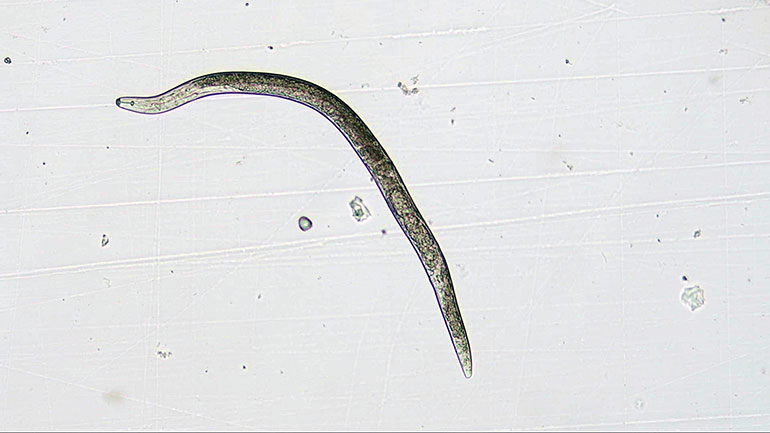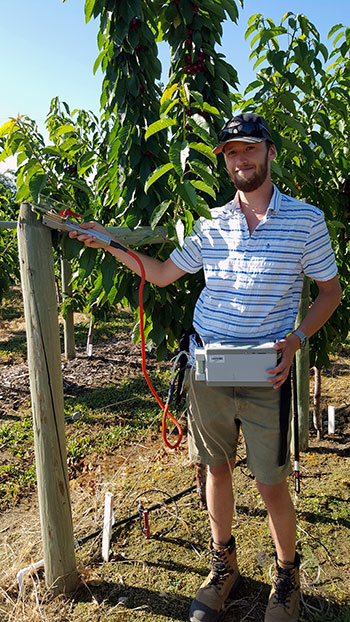
A microscopic image of the plant-parasitic nematode which can cause replant disease in cherry trees. (photo courtesy of Tristan Watson)
UBC researchers say root disease may be prevented by using compost with young cherry trees
Material currently thought of as garbage may be the answer to preventing root disease in cherry orchards without the use of fumigation, according to new research from UBC Okanagan.
PhD student Tristan Watson, co-supervisors adjunct professor Tom Forge and Biology Professor Louise Nelson, and colleagues at Agriculture and Agri-Food Canada’s Summerland Research and Development Centre (AAFC-SuRDC) recently published research examining how agricultural waste compost and chipped bark mulch can help improve growth of newly-planted sweet cherry trees and protect them from replant disease.

UBC student Tristan Watson conducts research on root disease in cherry orchards.
“Replant disease—the poor growth of fruit trees planted into soil previously used for tree-fruit production—presents a significant barrier to establishing productive orchards on old orchard soil,” explains Forge, who conducts research at AAFC-SuRDC. “Newly planted trees impacted by this disease often show reduced shoot growth, root necrosis, and a reduction in root biomass.”
Over time, populations of several types of soil-borne pests including plant-parasitic nematodes—microscopic roundworms—build up under established orchard trees, explains Watson. Then, when an old orchard is pulled out to replant a newer variety or different type of fruit crop, those soil pests can severely affect the young trees. Left untreated, the disease can delay fruit production, decrease quality, and reduce yield, thus preventing an orchard from reaching an acceptable level of productivity.
“In the past, chemical fumigants were often used to kill the pathogenic organisms in the soil before new trees are planted,” he says. “These fumigants are meant to kill everything in the soil, and unfortunately this includes beneficial micro-organisms.”
During his research in a former apple orchard, Watson used agricultural waste compost, and chipped bark mulch, on newly-planted cherry trees. The compost was applied to the planting row of some cherry trees as they were planted, and for other plots of trees in the study high carbon organic mulch was applied to the surface after the trees were planted.
Watson says the organic applications—both the compost and the bark mulch, but especially the combined treatment—significantly reduced infestation of the cherry roots by root lesion nematodes.
Most importantly, there were corresponding increases in early tree growth that have continued three years into the research.
“The recycling of waste is key to this research,” says Watson. “There is a definite reduction in the pest population that continued into three growing seasons. Replant disease is an issue around the world for all tree fruits and this is a great option for conventional and organic farmers.”
“Overall, using compost and bark mulch show potential as alternatives to fumigation for improving early growth of sweet cherry trees in pathogen-infested soil,” he says. “I’m hoping the research can be expanded to wine grapes and other tree fruits including peaches, pears and plums. ”
Watson’s research was recently published in Applied Soil Ecology and was supported with funding from Agriculture and Agri-Food Canada Agricultural Innovations Program, the BC Fruit Growers’ Association, and the BC Cherry Association.
—30—